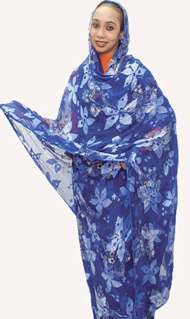In Sudan tob trends, the ‘Hummer’ may be the new ‘Ocampo’
September 9, 2008 (KHARTOUM) — Fashion-conscious women in Sudan anxious to look their best for the Muslim holy month of Ramadan are scouring the capital in search of this season’s must-have item — which may not even exist.

Many have heard about the mysterious Ocampo, but few have seen it and fewer still have got their hands on one.
Traders were quick to cash in on the controversy when International Criminal Court chief prosecutor Luis Moreno-Ocampo in July asked for an arrest warrant for President Omar al-Beshir for alleged war crimes in Darfur.
His announcement sparked outrage in Sudan, with supporters of Beshir and his National Congress Party taking to the streets shouting “Death to Ocampo!” — albeit in nothing like the numbers predicted by frenzied observers.
Two months later, the Argentine-born lawyer’s name has been linked to the glittering, sequin-encrusted concoctions of floating chiffon which make up the colourful sari-like dresses, or tobs, traditional in the desert country.
Along with other merchandise, tobs have long been named — by customers or merchants — as marketing gimmicks, after political events, personalities, singers, musicians and, in one case, a telecoms company.
Even mentioning the ICC prosecutor’s name is rumoured to be fraught with danger, however. One local media report, impossible to confirm, said a bus driver was arrested for having a sign saying “Ocampo is coming.”
But the forbidden always has an illicit thrill, and wily shopkeepers are taking advantage of the prosecutor’s notoriety as trend-setting Sudanese fashionistas queue up to make hushed requests for the beautiful garments.
“I’d buy one. I’ve heard it’s a really beautiful design. Silk, isn’t it?” student Razaz Munir, 24, asked from the back seat of a car beside her younger sister as they headed for the Libya market in Khartoum’s twin city of Omdurman.
“I’ve never actually seen it but I’ve heard about it from the other girls. I’d choose it because of the design, if I like it. Not because of its name. Anyway, it’s just a person so what does it matter?”
Tobs are made from several metres (yards) of cotton, silk or chiffon wound round the body, with the most expensive coming from Switzerland and the cheapest made in India.
Previous styles of tob have included the Naivasha, named after the Kenyan town where negotiations were held to end Sudan’s bitter north-south civil war.
Munir’s keen sartorial sense has also led her to buy Salva Kiir sandals — Kiir is vice president and leader of the former warring south — and a Shanghai skirt, named after the booming city in Sudan’s closest foreign ally, China.
“Merchants give them these names in order to sell their merchandise. I also bought a perfume called Sahhaf, after the former Iraqi information minister,” she said.
Mohammed Said al-Sahhaf, nicknamed Comical Ali in the West, shot to fame for his enthusiastically upbeat assessments of the Iraqi war effort during the 2003 US-led invasion, despite the Americans’ rapid capture of Baghdad.
Ramadan, the month of Muslim fasting, brings much of Sudan’s scorching capital to a standstill, apart from the mad traffic dash as famished drivers rush home at dusk for mealtime.
But Ramadan is also prime shopping season, when women dig deep to look their best for the family evening meal and the Eid al-Fitr feast at the end of the month.
The Ocampo tob has been the subject of several stories in the Arabic media — but despite its reported popularity, actually finding one proved impossible.
Some traders said a consignment was on order from Dubai, while others said they refused to stock it.
Munir was annoyed that a tour of Libya market with an AFP journalist failed to find a single shopkeeper who admitted to having heard of the Ocampo tob.
“If I’d been alone, they would have told me everything. They’re frightened because this tob is available. Everybody knows it,” she said quietly, once back in the car.
Tradesmen said the Burj al-Fateh — named after the new luxury hotel gracing the banks of the Nile — was the newest and most popular garment.
Shopkeepers were more positive in the stores of Khartoum North and the Khartoum Two suburb, with at least four saying women had asked whether the Ocampo was in stock and what it looked like.
“I’ve ordered a large quantity of Ocampo tobs because it’s the latest thing,” beamed Abdul Nasr al-Siir, 34, from behind his counter.
“Yes, definitely people have come in to ask about it,” he added, getting out four metres of red chiffon called Hummer.
This fabric is named after the flashy US-made vehicle and can retail for up to 300 dollars (210 euros) a tob. Siir is pretty confident that the Hummer will be the new Ocampo.
Not everyone thinks giving clothes such controversial names is a good idea.
“If you call a tob Ocampo you’ll go to jail!” a man shouted from the depths of one store.
“No tob called Ocampo will ever come into my shop. If Ocampo is available in shoes I’ll buy them instead,” said Tilal al-Nur in a nod towards the low regard for anything to do with the soles of the feet.
(AFP)
